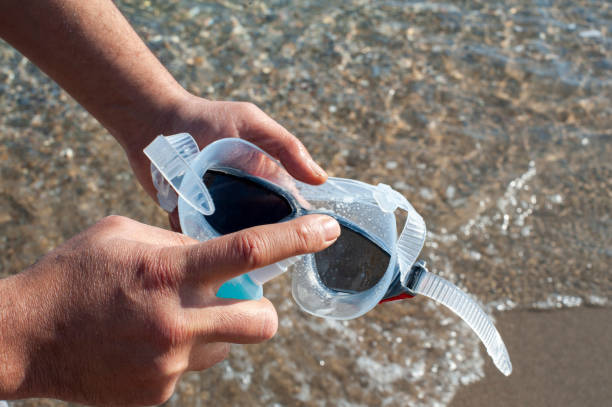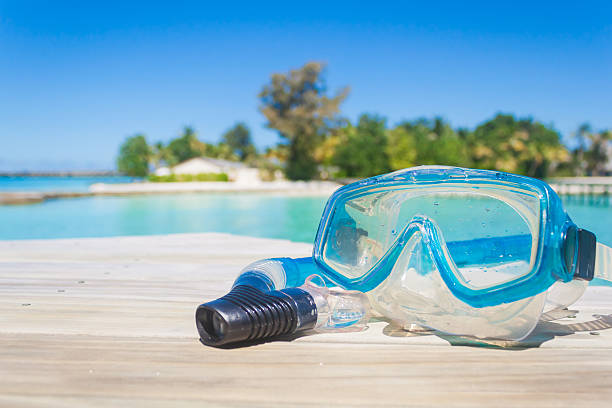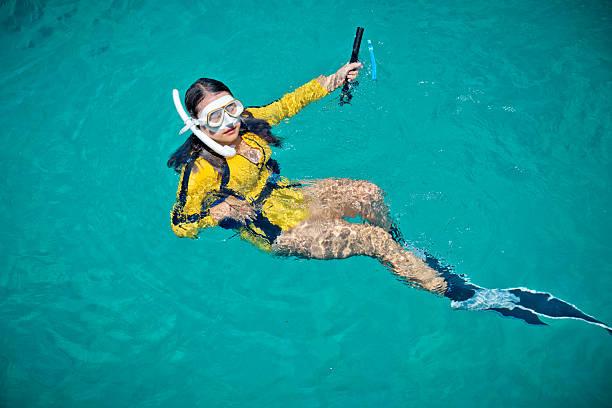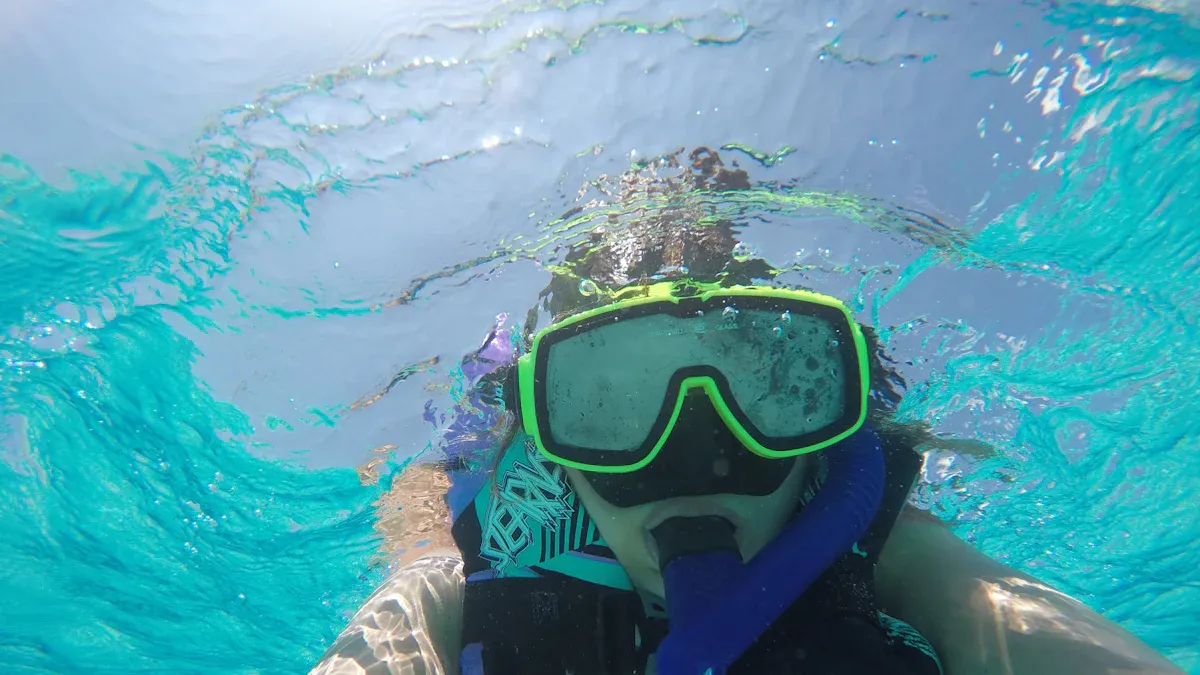
قناع الغوص المناسب يُشكّل الفارق بين مغامرة تحت الماء لا تُنسى وتجربة غير مريحة أو حتى خطيرة. سواء كنت غواصًا مبتدئًا أو غواصًا محترفًا، فإن فهم كيفية اختيار قناع الغوص المناسب يضمن رؤيةً أفضل وراحةً وأمانًا.
يغطي هذا الدليل كل ما تحتاج إلى معرفته - بناءً على تجربة الغوص وملاءمة الوجه وخيارات العدسات والمزيد - لمساعدتك في اختيار قناع الغوص الأفضل لاحتياجاتك.
أهمية قناع الغوص المناسب
عند اختيار قناع غوص، فأنت تريد أن تشعر بأنه يناسب وجهك. لا يقتصر الأمر على الراحة فحسب، مع أن هذا مهم للغاية. إذا لم يُحكم قناعك بإحكام، فسيتسرب الماء ويُفسد غوصتك. قد تقضي وقتًا أطول في تنظيف قناعك بدلاً من الاستمتاع بالمنظر. لذلك، يجب عليك دائمًا التحقق من كيفية... قناع الغوص يناسبك قبل شرائه.
المقاس المناسب يضمن سلامتك تحت الماء. إذا لم يُغلق قناع الغوص بإحكام، فقد تواجه مشاكل خطيرة. تناولت بعض الدراسات ما يحدث عندما يستخدم الغواصون أقنعة أو قطع فم غير مناسبة.
تُظهر هذه الدراسات أن الختم المُحكم يُمكن أن يُنقذ الأرواح. فاستخدام قناع غوص مُناسب تمامًا يُقلل من خطر التسرب والمواقف الخطرة. كما يُعزز راحتك، ما يعني أنه يُمكنك التركيز على الجمال من حولك بدلًا من مشاكل القناع.
العوامل الرئيسية التي يجب مراعاتها عند اختيار قناع الغوص
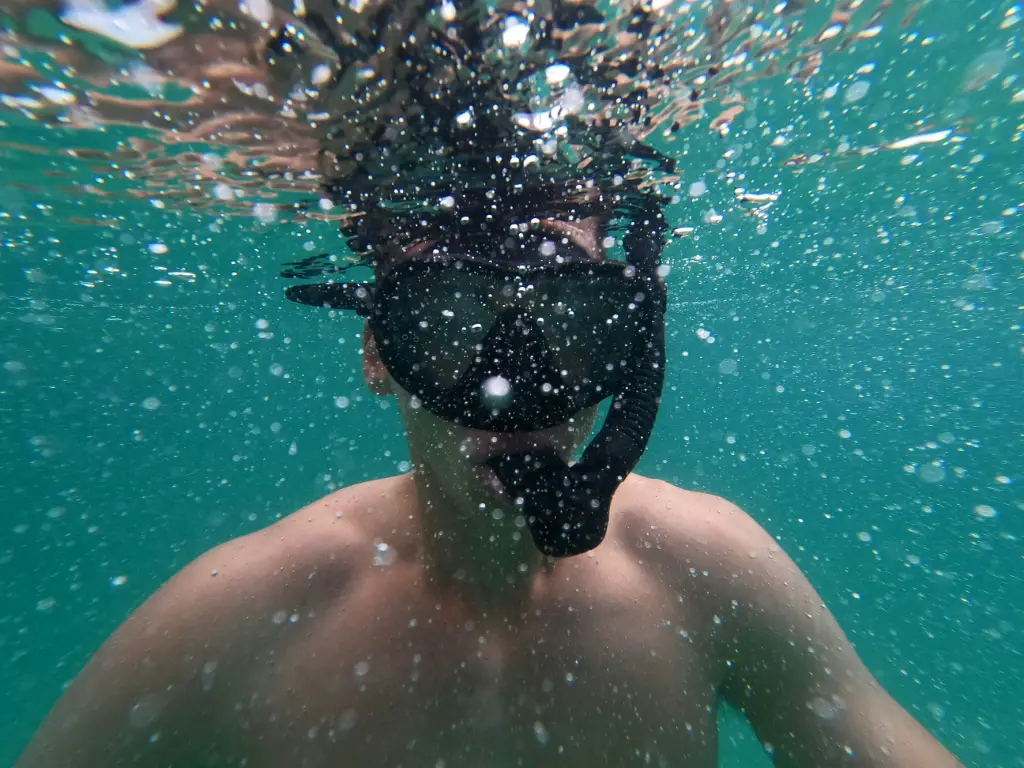
لمعرفة كيفية اختيار قناع الغوص، عليك مراعاة بعض الأمور المهمة. قناع الغوص المناسب يجعل مغامرتك تحت الماء آمنة وممتعة. لنستعرض الميزات التي يجب مراعاتها عند شراء قناع الغوص.
الملاءمة والراحة
تريد أن يكون قناع الغوص مريحًا على وجهك. جرّب أقنعة مختلفة. تأكد من أن الحافة محكمة الإغلاق ولا تضغط على أنفك أو جبهتك بشدة. إذا شعرت بأي تسريب أو ضغط، فجرّب قناعًا آخر.نوع العدسة والرؤية
بعض الأقنعة مزودة بعدسة كبيرة واحدة، بينما تحتوي أخرى على عدستين صغيرتين. تُعد الأقنعة ذات العدسات المزدوجة شائعة الاستخدام لأنها تناسب مختلف أشكال الوجه، وتتيح لك إضافة عدسات طبية عند الحاجة. تمنحك العدسات الشفافة رؤية واسعة. تستخدم بعض الأقنعة زجاجًا خاصًا لتحسين الوضوح.مادة التنورة
ابحث عن غطاء سيليكون ناعم. فهو يجعل القناع أكثر راحةً ويساعد على منع تسرب الماء. تجنب الغطاء البلاستيكي الرخيص، فهو قصير الأمد وقد يتسرب.نظام الحزام والإبزيم
أحزمة سهلة التعديل تساعدك على الحصول على المقاس المناسب. مشابك سريعة الفك تُسهّل خلع قناعك، حتى مع ارتداء القفازات.حجم القناع
أقنعة الغوص منخفضة الحجم أسهل في التنظيف والتوزيع. فهي أقرب إلى الوجه، ومناسبة للمبتدئين والغواصين ذوي الخبرة على حد سواء.الميزات الخاصة
بعض أقنعة الغوص مزودة بطبقات مضادة للضباب، وحماية من الأشعة فوق البنفسجية، أو حتى بتنانير ملونة لتقليل الوهج. هذه الميزات تجعل غوصك أكثر متعة.
قناع الغوص الملائم لأسلوب الغوص الخاص بك
قد تتساءل إن كان أسلوب غوصك مهمًا حقًا عند اختيار قناع الغوص. الإجابة هي نعم! أسلوب غوصك هو ما يحدد نوع القناع الأنسب لك. لنلقِ نظرة على بعض أساليب الغوص الشائعة وما يجب مراعاته:
الغوص الترفيهيأنت ترغب في قناع مريح للغوصات الطويلة. تنورة سيليكون ناعمة ومجال رؤية واسع يُساعدانك على الاستمتاع بالمناظر الطبيعية. يُفضل العديد من الغواصين الترفيهيين الأقنعة ذات العدسات الشفافة والأحزمة سهلة التعديل.
الغطس:تقضي وقتًا أطول على السطح. أ قناع منخفض الحجم يجعل من السهل إزالة الماء إذا تسرب. يفضل بعض الغواصين الأقنعة ذات الوجه الكامل لأنها تسمح لك بالتنفس من خلال أنفك وفمك.
الغوص الحرأنت بحاجة إلى قناع بمستوى صوت منخفض جدًا. هذا يُسهّل موازنة الصوت عند الغوص بشكل أعمق. ابحث عن قناع مُحكم لا يتحرك مع الحركة السريعة.
الغوص التقني أو العميقأنت بحاجة إلى قناع يُغلق بإحكام ويقاوم الضباب. تُساعدك خيارات العدسات الطبية والطلاءات المضادة للضباب على الرؤية بوضوح في المياه العميقة الداكنة.
كيفية اختبار الملاءمة قبل الشراء
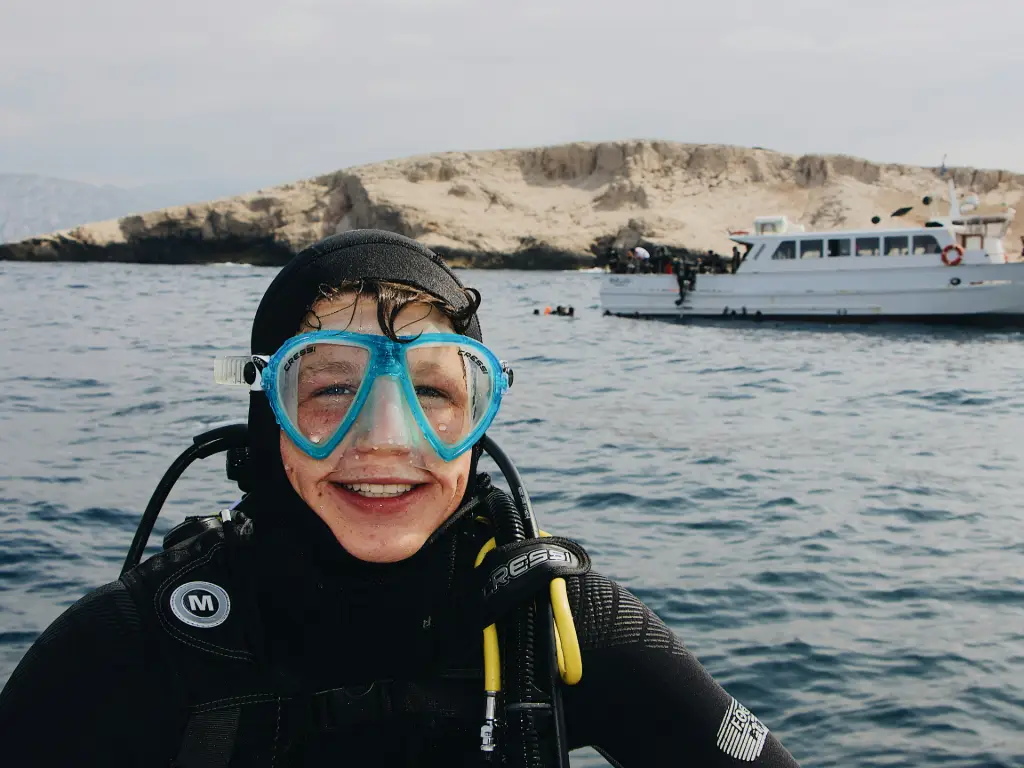
انت تريد قناع الغوص مريح ويمنع دخول الماء. اختبار المقاس قبل الشراء يُحدث فرقًا كبيرًا. إليك كيفية اختيار قناع يناسبك تمامًا في كل مرة تتسوق فيها.
ضع القناع على وجهك
ضع قناع الغوص برفق على وجهك دون استخدام الحزام. تأكد من إبعاد شعرك عن وجهك. اضغط على القناع برفق واستنشق الهواء من أنفك. يجب أن يلتصق القناع بوجهك لبضع ثوانٍ. إذا سقط، جرب قناعًا آخر.التحقق من وجود فجوات ونقاط الضغط
مرر أصابعك حول حافة القناع. يجب ألا تشعر بأي فجوات أو نقاط حادة. القناع الذي يناسبك تمامًا سيكون ناعمًا ومتساويًا من جميع الجوانب.ابتسم وحرك وجهك
ابتسم ابتسامة عريضة أو حرك أنفك. يجب أن يبقى قناع الغوص ثابتًا في مكانه دون أن يضغط أو يتسرب. إذا تحرك أو شعرت بضيق، فهو ليس القناع المناسب.جرب الحزام
ضع الحزام على رأسك واضبطه. يجب أن يكون القناع مُحكمًا، لكن ليس ضيقًا جدًا. أنت تريد الراحة، لا الضغط. تجوّل قليلًا ولاحظ ما إذا كان القناع يتحرك أو يبقى ثابتًا.
باتباع هذه الخطوات، ستجد قناعًا يناسبك تمامًا. ستستمتع بكل غوصة مع قناع غوص يناسبك تمامًا. تذكر، القناع المناسب يعني متعة أكبر وجهدًا أقل تحت الماء.
الأخطاء الشائعة التي يجب تجنبها عند شراء قناع الغوص
قد يكون شراء قناع غوص أمرًا مُرهقًا، خاصةً إذا كنت جديدًا في هذه الرياضة. يرتكب العديد من المبتدئين نفس الأخطاء، ولكن يمكنك تجنبها بقليل من المعرفة. إليك بعض الأخطاء الأكثر شيوعًا:
الاختيار حسب المظهر وحده
قد ترى قناعًا بلونك المفضل أو بتصميم رائع وترغب في اقتنائه فورًا. قد يكون المظهر جذابًا، لكنه لا يضمن الراحة أو الأداء. ضع الراحة دائمًا في المقام الأول.تجاهل اختبار الختم
يتجاهل بعض الأشخاص اختبار الشفط في المتجر. إذا لم تتحقق من سلامة الختم، فقد تتعرض لتسربات تحت الماء. خصص لحظة للضغط على القناع على وجهك والتنفس برفق من أنفك. يجب أن يبقى القناع في مكانه دون رباط.شراء الحجم الخطأ
تتوفر الأقنعة بأحجام مختلفة. إذا اخترت أول قناع تراه، فقد لا يناسب شكل وجهك. جرّب عدة خيارات للعثور على الأنسب لك.شد الحزام بشكل مفرط
قد تعتقد أن إحكام الحزام يعني إحكامًا أفضل. في الواقع، قد يسبب هذا انزعاجًا وتسربات أكثر. التنورة هي التي تُشكّل الإحكام، وليس الحزام.نسيان خيارات العدسات
بعض الغواصين لا يُراعون احتياجاتهم البصرية. إذا كنت ترتدي نظارات، فابحث عن أقنعة تسمح باستخدام العدسات الطبية. الرؤية الواضحة تجعل كل غوصة أكثر أمانًا ومتعة.
تجنب هذه الأخطاء سيساعدك على اختيار قناع مريح وعملي. خذ وقتك، وثق بحدسك، واستمتع بالتجربة. قليل من الصبر الآن يُؤدي إلى غوص أفضل لاحقًا.
ما نقدمه كشركة مصنعة احترافية لأقنعة الغوص
في سباحة الطليعةنحن متخصصون في إنتاج أقنعة الغوص عالية الأداء المصممة خصيصًا لتلبية احتياجاتك المحددة:
- دعم OEM/ODM: سواء كنت تقوم ببناء علامة تجارية أو تخصيصها لفئة معينة، فإننا نقدم لك حلولاً مرنة للتصميم والقوالب والتعبئة والتغليف.
- اختيار المواد الممتازة: من السيليكون الطبي إلى العدسات المقواة فائقة الوضوح، فإننا نستخدم فقط مواد معتمدة ومتينة.
- فلسفة التصميم الملائم أولاً: تخضع أقنعتنا لاختبارات قياس الجسم الصارمة لضمان سلامة الختم عبر أشكال الوجه المختلفة.
- التصنيع القابل للتطوير: من النماذج الأولية للدفعات الصغيرة إلى الإنتاج الضخم، نضمن مراقبة الجودة المتسقة والتسليم في الوقت المحدد.
إذا كنت تبحث عن مورد موثوق به يفهم احتياجات الغواصين المعاصرين، نحن هنا لدعم نموك.
التعليمات
كيف أمنع قناع الغوص الخاص بي من الضباب؟
يمكنك استخدام بخاخ مضاد للضباب تجاري أو فرك القليل من شامبو الأطفال داخل العدسة. اشطفها قبل الغوص. البصق مفيد في حالات الضرورة. ابدأ دائمًا بقناع نظيف وجاف.
هل يمكنني ارتداء النظارات تحت قناع الغوص؟
لا، لن تتناسب النظارات العادية مع قناعك. يمكنك شراء قناع بعدسات طبية أو استخدام العدسات اللاصقة. يمكن للعديد من متاجر الغوص مساعدتك في العثور على الخيار المناسب.
ما مدى إحكام قناع الغوص الخاص بي؟
يجب أن يكون قناعك مُحكمًا، لكن ليس ضيقًا. يجب أن يُثبّت طرفه برفق على وجهك. إذا شعرت بضغط أو ألم، فرخّ الحزام. يجب أن يبقى القناع ثابتًا مع استنشاق خفيف.
كيف أقوم بتنظيف قناع الغوص الخاص بي وتخزينه؟
اشطف قناعك بالماء العذب بعد كل غوصة. اتركه يجف في الهواء بعيدًا عن أشعة الشمس المباشرة. خزّنه في مكان بارد وجاف. احتفظ به في علبة واقية لتجنب الخدوش.
